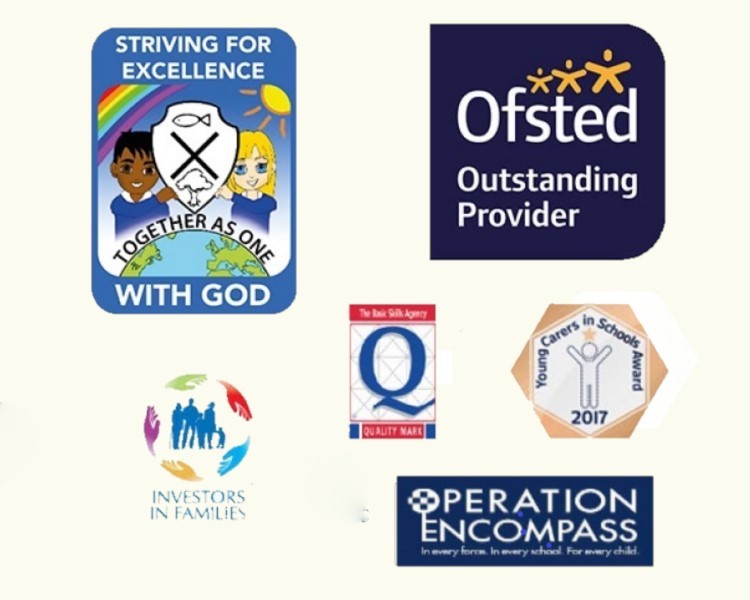English
The National Curriculum for English intends to ensure that all pupils:
- Read easily, fluently and with good understanding
- Develop the habit of reading widely and often, for both pleasure and information
- Acquire a wide vocabulary, an understanding of grammar and knowledge of linguistic conventions for reading, writing and spoken language
- Appreciate our rich and varied literary heritage
- Write clearly, accurately and coherently, adapting their language and style in and for a range of contexts, purposes and audiences
- Use discussion in order to learn; they should be able to elaborate and explain clearly their understanding and ideas
- Are competent in the arts of speaking and listening, making formal presentations, demonstrating to others and participating in debate.
Intent
At St Andrew’s Primary School, we recognise that English extends to all aspects of a pupil’s life. The study of English develops children’s abilities to listen, speak, read and write for a wide range of purposes, including the communication of ideas, views and feelings. Children become empowered to interpret the world around them and make sense of their experience; in this sense literacy is a tool for our thinking and our learning.
We intend that our pupils are at the heart of the English learning process, enabling them to express themselves creatively and imaginatively as they become enthusiastic and critical readers of stories, poetry and play-scripts/drama, as well as a range of non-fiction and multi-media texts.
Implementation
Reading, Writing and Phonics or Spelling lessons are taught throughout the school on a daily basis, and the skills acquired are interwoven throughout all subjects within our curriculum.
Our chosen Phonics Scheme is ‘Supersonic Phonic Friends.’ The main reading schemes used in Early Years and Key Stage 1 are Oxford Reading Tree, Jelly and Bean, and Rigby Star phonic books.
Impact
At St Andrews, we are constantly monitoring understanding and progress in Reading and Writing within English sessions, and in cross curricular lessons. This may be done through summative assessments, peer or class discussion, self or peer assessment, mini-plenaries, or by assessing written or oral work. This informs the ‘next steps’ for pupils.
Students are given feedback about their work through marking, stampers or via verbal discussion, which they are taught to respond to from an early age, ensuring that editing and improving their work is a core part of the children’s daily learning.
Policies
English policy DOWNLOAD
Phonics policy DOWNLOAD
KS2 Guided Reading policy DOWNLOAD
Handwriting policy 2024 DOWNLOAD
Reading policy DOWNLOAD
Progression
Reading Whole School Progression Overview DOWNLOAD
Writing Whole School Progression Overview DOWNLOAD
English National Curriculum DOWNLOAD
Supersonic Phonics Friends Progression Overview DOWNLOAD
Reading Spines
Our progressive ‘Reading Spines’ offer our children high-quality text selections that consider narrative, poetry and non-fiction. Hence, by the time pupils finish Year 6, they have read and experienced books from a wide range of genres and authors, with an extensive, rich vocabulary, supporting them in gaining a broader knowledge of the world.
These books (and the books within our provision) offer representations of a range of cultures, religions, family structures, disabilities and economic status’, offering increasingly challenging themes as the children move through the school.
These books (and the books within our provision) offer representations of a
range of cultures, religions, family structures, disabilities and economic
status’, offering increasingly challenging themes as the children move through
the school.
It is important to note that some of the books included in our ‘Reading Spines’ are read within class purely for pleasure, aiming to instil a love of reading in all our students. While other texts are used as a stimulus to inspire children when creating their own written and oral pieces.
We utilise our Reading Spines as ‘Working documents’, aiming to meet our pupils’ changing needs and interests.
Nursery Reading Spine DOWNLOAD
Reception Reading Spine DOWNLOAD
Year 1 Reading Spine DOWNLOAD
Year 2 Reading Spine DOWNLOAD
Year 3 Reading Spine DOWNLOAD
Year 4 Reading Spine DOWNLOAD
Year 5 Reading Spine DOWNLOAD
Year 6 Reading Spine DOWNLOAD
Poetry reading spine
https://standrewsmethodistschool.co.uk/wp-content/uploads/2024/01/Poetry-Spine-1.pdf
